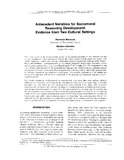| dc.contributor.author | Markoulis, Diomedes | |
| dc.contributor.author | Valanides, Nikolaos | |
| dc.date.accessioned | 2018-02-12T09:50:23Z | |
| dc.date.available | 2018-02-12T09:50:23Z | |
| dc.date.issued | 1997 | |
| dc.identifier.issn | 0020-7594 | |
| dc.identifier.uri | http://hdl.handle.net/11728/10477 | |
| dc.description | Cette etude examine le developpement du raisonnement socio-moral dans deux milieux culturels differents et se concentre sur les facteurs qui sont supposes influencer la croissance dans ce domaine particulier. Les hypotheses qui sont specifiquement testees touchent a la relation entre la pensee operatoire telle que definie dans la theorie de Piaget et la conceptualisation de Kohlberg du developpement du jugement socio-moral. Les sujets (N = 281) qui participent a cette etude sont des etudiants des niveaux secondaire et universitaire de Grece et du Nigeria qui sont ages entre 15 et 22 ans. Les resultats indiquentque (1) la sequence developpementale estsimilaire dans les deux environnements culturels,(2) l'atteinte des stades differe dans les deux groupes et (3) l'hypothese ''necessaire mais non suffisant'' est confirmee dans les deux groupes. Les explications possibles de ces resultats sont discutees en relation avec les postulats de base de l'approche structurale-developpementale a la croissance socio-cognitive. | en_UK |
| dc.description.abstract | This study examined the developmental pattern of sociomoral reasoning in two different cultural settings, focusing on factors assumed to influence the course of growth in this particular domain. The specific hypotheses tested concerned the relationships between operational thinking within Piaget's theory and Kohlberg's conceptualization of sociomoral judgement development. Secondary school and university students from Greece and Nigeria aged 15 to 22 years (N = 281) participated in the study. Results indicated that (1) the developmental sequence was similar in the two differing cultural environments, (2) stage endorsement differed significantly in the twosamples,and(3) the necessary-butnot-sufficient hypothesis was confirmed in both groups. The possible explanations of the findings are discussed in connection with the basic assumptions of the structural-developmental approach to sociocognitive growth. | en_UK |
| dc.language.iso | en_US | en_UK |
| dc.publisher | Taylor & Francis | en_UK |
| dc.relation.ispartofseries | International Journal of Psychology;1997, vol. 32, (5), 301-313 | |
| dc.rights | © 1997 International Union of Psychological Science | en_UK |
| dc.rights.uri | http://creativecommons.org/licenses/by-nc-nd/4.0/ | en_UK |
| dc.subject | Research Subject Categories::SOCIAL SCIENCES::Social sciences::Psychology::Cognitive science | en_UK |
| dc.subject | structural development approach | en_UK |
| dc.subject | developmental pattern | en_UK |
| dc.subject | sociomoral reasoning | en_UK |
| dc.title | Antecedent variables for sociomoral reasoning development: evidence from two cultural settings | en_UK |
| dc.type | Article | en_UK |
| dc.doi | 10.1080/002075997400674 | en_UK |


